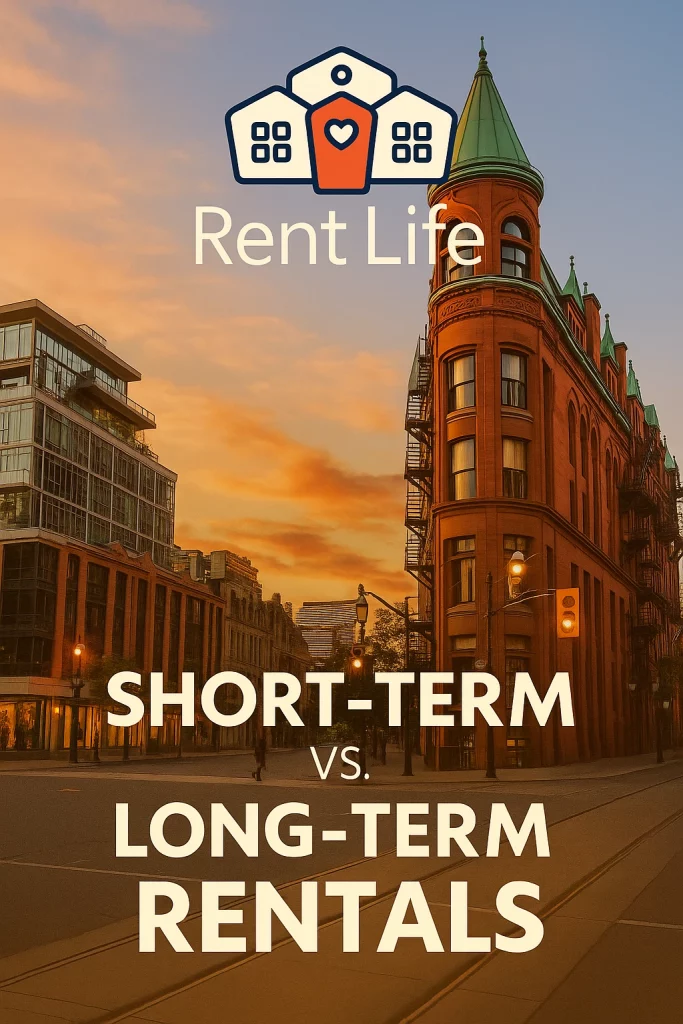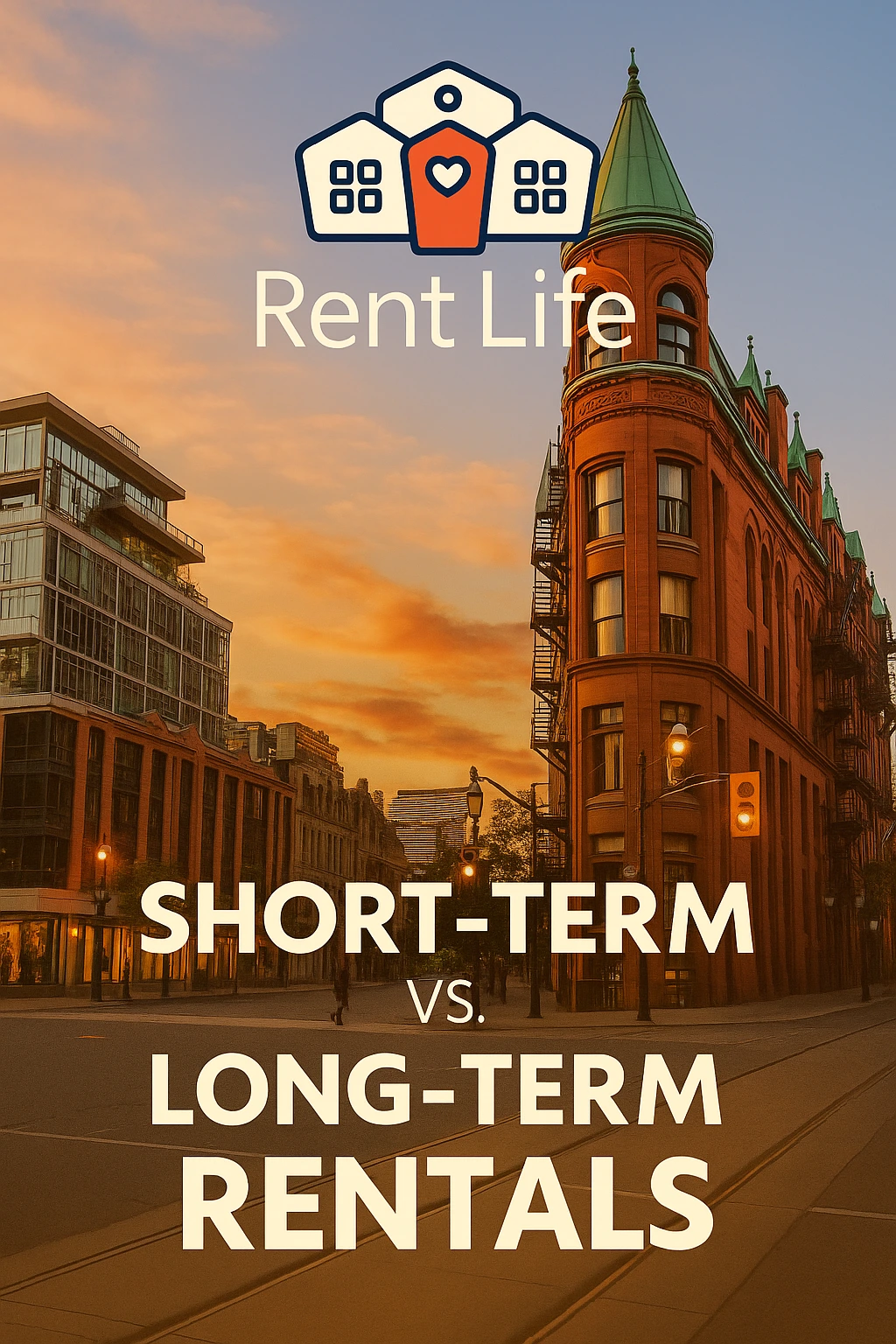
Rent
Short-Term vs. Long-Term Rentals in Canada (2025): What’s the Right Move for You?
The Canadian rental market in 2025 is evolving fast. With housing affordability tightening and new regulations shaking up the landscape, understanding the pros and cons of short-term and long-term rentals is more important than ever—for tenants, landlords, and investors alike.
🔁 Short-Term Rentals (STR): Flexible & High-Earning—But Tricky
Why Some Landlords Love STRs
Short-term rentals—like those listed on Airbnb or Rent Life’s furnished sublets—can generate 30–50% more income annually than traditional rentals, especially in hot travel destinations or during major local events. The flexibility to adjust pricing or use the property yourself is a major perk for owners.
But… There’s a Catch
STRs demand serious hustle: managing guest check-ins, cleanings, dynamic pricing, and responding to reviews. Cities like Toronto, Vancouver, and Montreal have cracked down with strict regulations, requiring registration, taxes, and even limiting rental days. Some federal rules now block tax deductions in heavily restricted areas—shrinking your bottom line.
Quick STR Takeaways:
✔️ High earning potential
✔️ Personal use flexibility
❌ Time-consuming management
❌ Hefty regulations and volatility
🏘️ Long-Term Rentals (LTR): Steady & Secure—With Fewer Surprises
Why Stability Wins in 2025
Long-term rentals offer what many Canadians now seek: predictable monthly income, fewer headaches, and lower regulatory complexity. With tight vacancy rates and high demand in cities like Edmonton, Belleville, and Halifax, LTRs shine in terms of stability—even outside big urban centers.
The Flip Side?
Locked-in leases limit flexibility. You can’t raise rent on a whim, and a bad tenant could cause extended stress. But for many, the tradeoff is worth the peace of mind.
Quick LTR Takeaways:
✔️ Reliable income stream
✔️ Simpler management
❌ Less flexible usage
❌ Risk of problem tenants
⚖️ STR vs. LTR: Head-to-Head
| Feature | Short-Term Rental | Long-Term Rental |
|---|---|---|
| Income | Higher, but variable | Stable and predictable |
| Flexibility | High for owner use & pricing | Low—fixed terms |
| Management | Intensive (cleaning, bookings) | Light (lease, periodic repairs) |
| Regulation | Heavy & local-specific | Standard landlord-tenant law |
| Risk | Seasonal vacancy, tax exposure | Tenant turnover, potential disputes |
🔍 What’s Right for You?
- Choose STRs if you love flexibility, live in a high-demand tourist area, and can commit to active property management—or if you plan to use the space part-time.
- Opt for LTRs if you value steady income, low hassle, and plan to hold the property long-term.
The golden rule? Know your city, know your comfort level, and know your numbers.
📲 Start smart. Choose the right rental strategy with Rent-Life.ca.
Explore available rentals, get landlord support, and list properties all in one place.
🔗 Download the Rent Life App
🛡️ Protect your lease with Duuo Insurance
#RentLife #CanadianRentals2025 #STRvsLTR #SmartRenting #RentalStrategy #RealEstateCanada #RentSmarter
Links;
[1] https://www.keyperpm.ca/post/short-term-vs-long-term-rental-management-in-toronto-which-is-right-for-you-in-2025
[2] https://adastra.host/tpost/bd6my5bv71-airbnb-vs-long-term-rentals-what-makes-m
[3] https://fullhome.ca/short-term-rental-vs-long-term-rental/
[4] https://www.remaxwealth.com/insights/short-term-vs-long-term-rentals-which-strategy-wins-in-2025
[5] https://www.kelownahomes.ca/blog/short-term-rental-vs-long-term-rental.html
[6] https://greycountyhomes.com/blog/8-things-to-think-about-before-running-a-short-term-rental/
[7] https://www.blueanchorpm.rent/airbnb-vs-long-term-rentals-ontario-2025/
[8] https://www.deeded.ca/blog/federal-changes-short-term-rentals
[9] https://www.cmhc-schl.gc.ca/observer/2025/2025-mid-year-rental-market-update
[10] https://www.squareyards.ca/blog/short-term-vs-long-term-rentals-regart/
